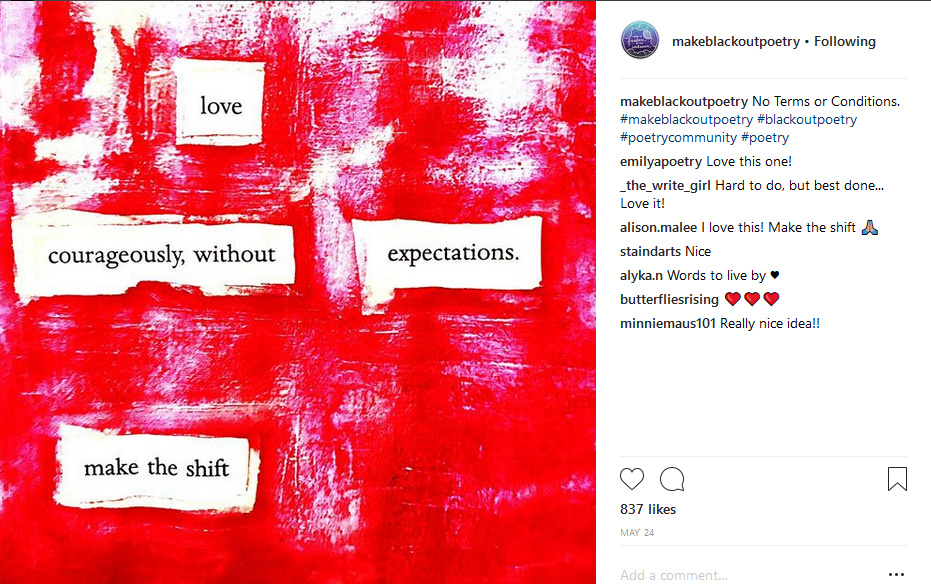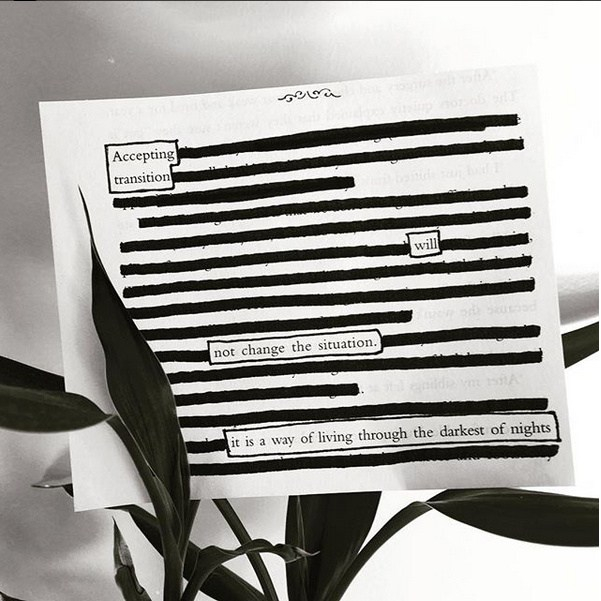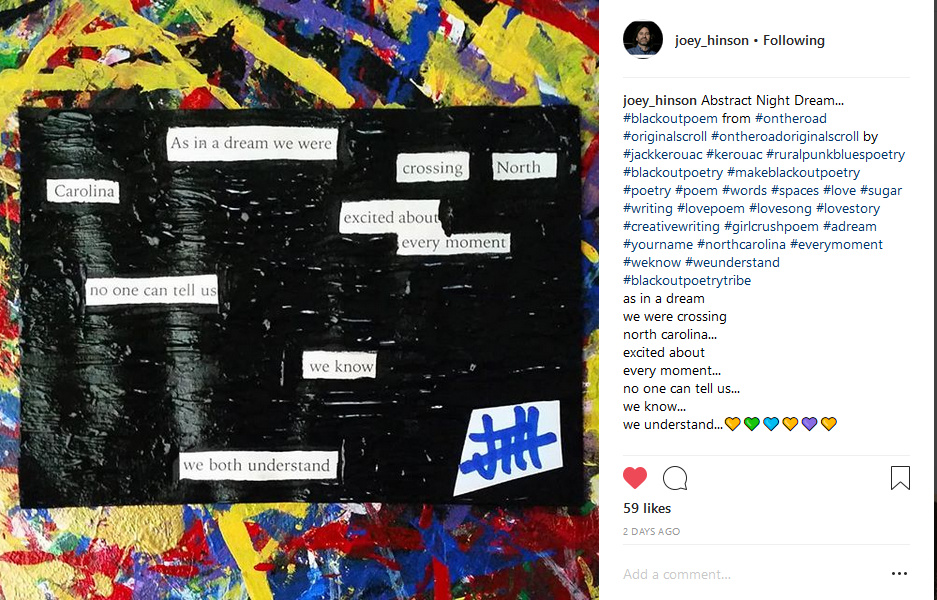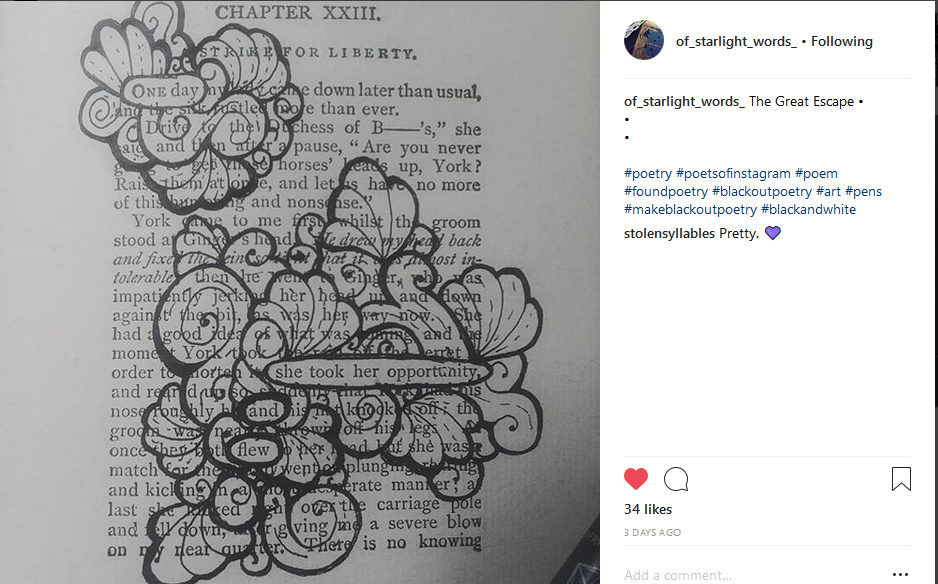I first heard about Blackout Poetry this year during National Poetry Writing Month (NaPoWriMo) through the Silverleaf Writer’s Guild. I was sitting in the boardroom for our weekly gathering when one of the writer’s told us that we’d being trying our hand at blackout poetry. Me, having no idea what that meant or what to expect, naturally started to come up with possibilities of what it was that we would be doing. Visions of trying to write poetry in the dark came to mind, but that was as far as my imagination and logic were going to take me. Not long after it was explained, I was lost creating my first blackout poem, and no, I wasn’t blindfolded trying to write either. Basically, blackout poetry takes an existing piece of writing (newspaper, page from a book) and “blacks out” (or colours in) all of the words that they don’t want leaving behind a poem.
I actually has this amazing opportunity to visit one of the grade four classes in my hometown and teach them about poetry. Growing up, poetry had a bad reputation with my peers. It wasn’t cool. It was boring, hard to understand, for the kids who hated the world, or English teacher who kept a collection of Sylvia Plath to torment you with the ever dreaded “tell me what you think the poet meant” (I’ll be doing another piece on that dreaded question in the future. In any case, when I asked these kids what they thought about when they heard the word “poetry” their answers blew me out of the water. “To tell someone you care about them”. “Love letters”. “A way to say things nicely”. “A way to tell people how you feel”. Whoa. These nine year olds were blowing my mind. This was my second time around teaching kids how to do poetry and the response is always mind blowing. They love it… when it’s presented in the right way. I sold the idea of poetry (specifically blackout poetry) as a way to make a secret code that only you understand. They loved it and when they had the chance to make their own blackout poems, I was once again impressed by these little souls.
How poetry is percieved has a lot to do with how it’s presented to you. Your teacher telling you to write a Haiku with step by step instructions? Tough sell. Secret codes? Bingo! I think that’s what blackout poetry does for the art. It make it accessible and interesting to the everyday person in a really fun and unique way. It fascinates me even more because you have a really neat opportunity to blend poetry with art, and now all of sudden can you can tap into people from other areas of interest. It’s a really versitile form of poetry that lets you take your creativity to new levels. You don’t have to rhyme, you don’t have to watch your syllable or words count, you just find the words that jump out at you. You can keep it simple, or make it colourful. Your imagination is the limit. I’ll show you what I mean.




So now you know what blackout poetry is and you have some of the basics on ways you can tackle your own. It’s really simple to get started. Find an old book (maybe an old harlequin someone left out at camp) and give it a shot. Personally, I have a hard time with taking any book and destroying it. It feels wrong to me, but don’t worry. You’re not limited to books. Newspapers, magazines, photocopies, anything with words that you can get your hands on will make a good medium.
I’d love to see what you come up with.
Happy Writing!
Thank you for this thoroughly interesting post on Black-out poetry, and i think i shall try do some. looks like fun. I found you here through reading one of Varnika Jain’s poems. I’ve just written a poem using song titles from the band “The Waterboys” a Celtic Folk/Rock group Ireland Scotland and England.
https://ivors20.wordpress.com/2018/08/10/the-dark-streets/
LikeLiked by 1 person
IVOR20, I can’t wait to see what you come up with!
LikeLike
I’ve never heard of black our poetry-+Ingenious!
LikeLiked by 1 person
It was relatively new to me to! Such a great way to play around and see what happens.
LikeLike
It’s so much fun! I’ve taught it in workshops a few times and it’s always a huge hit. If you like it, there’s also magnet poetry too. You can make your own or use a kit, but essentially it’s selecting from words written on magnets and using them to create a poem. All the best!
LikeLike